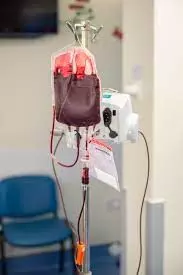LASG seals hospital for transfusing patients with controversial blood

The Lagos State Government has shut a private hospital at Ago-Okota in Oshodi-Isolo Local Government Area, for collecting and transfusing unscreened and unlabelled blood to unsuspecting patients.
Dr Bodunrin Osikomaiya, the Executive Secretary, Lagos State Blood Transfusion Service (LSBTS), said this in a statement signed by Tunbosun Ogunbanwo, Director, Public Affairs, state Ministry of Health, on Sunday in Lagos.
Osikomaiya said the LSBTS in collaboration with the state Health Facilities Monitoring and Accreditation Agency (HEFAMAA) sealed the facility following a tip-off from a concerned citizen.
“Following the tip off, and after thorough investigations, the enforcement teams of LSBTS and HEFAMAA, during their joint monitoring exercise in the area, visited the facility and confirmed to be true, the unwholesome, unprofessional and unethical medical practices and conduct of the hospital management,” Osikomaiya said.
She added that the facility was shut for contravening the blood transfusion service law and for unethical and unprofessional medical practice, as well as putting the lives of unsuspecting citizens at risk.
“The law states that no person within Lagos State shall transfuse blood into a patient unless such blood has been screened, tested, labeled by the state blood transfusion committee, and found to be negative for all transmissible diseases including HIV I and II, Hepatitis B and C, Syphilis and any other disease as may be deemed necessary by LSBTS,” she said.
Osikomaiya said the details of the blood donors and transfusion recipients had been retrieved from the management of the hospital.
She noted that patients who were transfused with the unscreened units of blood at the facility were being traced as part of protocol to ascertain their clinical health status and ensure their safety.
Osikomaiya stressed that the management of the hospital and workers found culpable in the unwholesome act would be prosecuted in accordance with appropriate laws.
She the agency had rejigged its strategies in sanitising the state against unethical blood transfusion practices and continued to wage war against unwholesome practice of transfusing unscreened blood in the state.
Osikomaiya appealed to citizens to support the war against unwholesome blood transfusion service by reporting infractions and unwholesome practices when they see any.
She also implored health workers and stakeholders involved in the blood transfusion chain, including blood banks, blood donation centres, and logistics firms to adhere strictly to WHO regulations and the state Blood Transfusion laws on blood donation, collection and transfusion.
“This war against unwholesome blood transfusion practices involves and affects every citizen, and as a result, the LBTS will step up the tempo through continuous monitoring of all facilities concerned with blood transfusion,” she said.
Osikomaiya said this would ensure a safe and wholesome blood transfusion chain and guarantee the safety of all citizens residing in the state.



